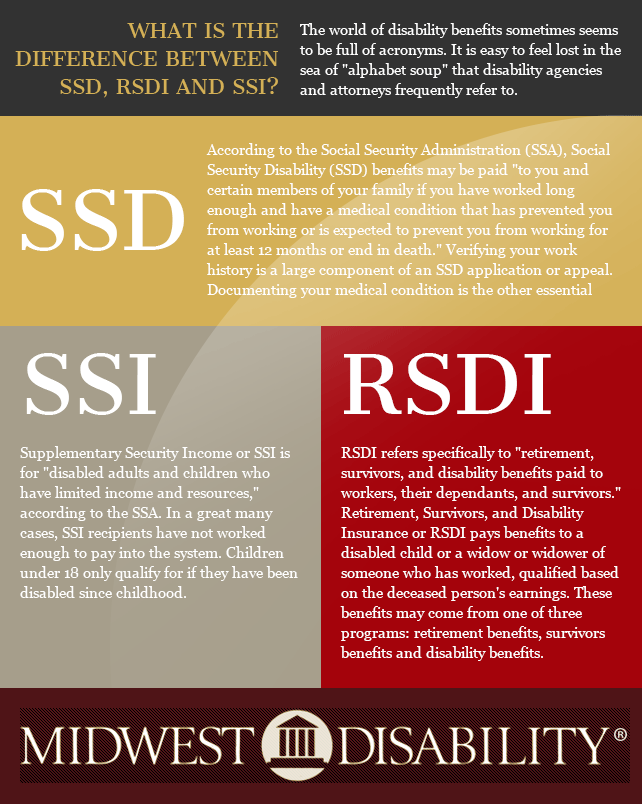What Is The Difference Between SSD, RSDI And SSI?
If you are like many people struggling with disabilities and related work and financial problems, you may not care about the terminology in the disability system. You just know that you cannot work and hold down a job, you need replacement for the income you cannot bring in by working, and you don’t have time to research what terms are assigned to those benefits.
At Midwest Disability, we understand. We do our best to help potential clients and clients of our firm understand the terms that we are so accustomed to. Acronyms such as SSD, RSDI and SSI are part of our everyday work lives. We regularly represent clients in administrative hearings and in courtrooms where these terms are part of the routine dialog.
Your injuries, medical conditions, income and potential disability benefits are all of great importance in your life. Attorneys at Midwest Disability, P.A., are prepared to advocate zealously on your behalf to help you tap into benefits you are eligible for. At the same time, we strive to educate you and explain what we mean when we talk about the terms such as those used in the infographic below.
For those who have difficulty reading the information on this graphic, we have included a non-image version of this information immediately underneath the graphic.
Text version of the graphic above:
- SSD : In the words of the Social Security Administration (SSA), Social Security Disability (SSD) benefits may be paid “to you and certain members of your family if you have worked long enough and have a medical condition that has prevented you from working or is expected to prevent you from working for at least 12 months or end in death.” Verifying your work history is a large component of an SSD application or appeal. Documenting your medical condition is the other essential aspect.
- RSDI: In the words of the SSA, RSDI refers specifically to “retirement, survivors, and disability benefits paid to workers, their dependants, and survivors.” Retirement, Survivors, and Disability Insurance or RSDI pays benefits to a disabled child or a widow or widower of someone who has worked, qualified based on the deceased person’s earnings. These benefits may come from one of three programs: retirement benefits, survivors benefits and disability benefits.
- SSI: Supplementary Security Income or SSI is for “disabled adults and children who have limited income and resources,” according to the SSA. In a great many cases, SSI recipients have not worked enough to pay into the system. Children under 18 only qualify for if they have been disabled since childhood.
For Information And Assistance Regarding SSD, RSDI Or SSI, Contact Our Attorneys
We realize that our familiarity with all the relevant terms will not be the same degree of familiarity that many of our clients possess — especially in the early stages of their status as disabled workers. We are here to explain what you need to know to pursue the disability benefits that are right for you. Call our office at or 888-351-0427 toll free, or complete our free case evaluation form online. At Midwest Disability, P.A., all cases are handled on a contingency fee basis. We don’t get paid unless and until we recover benefits on your behalf, and our lawyers’ fees are reviewed by the SSA.


